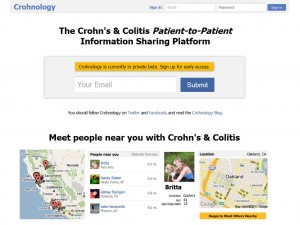A Chinese research study investigated if human derived stem cells can treat induced colitis in mice.
The researchers were specifically interested in studying human umblical cord mesenchymal stem cells which have a poor immunogenic response. This means they are less likely to trigger the immune system into attacking them. At the same time mesenchymal stem cells have potent immunosuppressive qualities, in that they suppress the autoimmune system response. Given these properties, they are being investigated extensively for treatment in those who have autoimmune related diseases. Continue reading “Umbilical Stem Cells May Offer Treatment For Inflammatory Bowel Diseases” »
Research done at Babraham Institute in the UK has shown that diets low or void of certain vegetables leads to a weakening of the protective microbial layer of the intestinal tract causing higher chances of inflammation while reducing healing capacity.
 The researchers focused on intra-epithelial lymphocytes(IELs) which reside just below the epithelial cell layer that makes up the walls of the intestinal tract. IELs play an important role in the immune response to foreign invaders, they are essentially the first line of defense against bacteria trying to setup shop in the intestinal tract or penetrate the intestinal lining. Mice involved in the study were given a specific diet that was devoid of “cruciferous vegetables”. Those given this diet showed a reduction in the number of IELs residing in their gut. They also looked at mice that were genetically modified to not have IELs. Both mice groups showed similar problems with regards to being able to control the microbial flora in their digestive tract as well as showing a slowed ability to heal from damage to the intestinal tract. Continue reading “Mustard, Broccoli & Other Veggies Key To Intestinal Health” »
The researchers focused on intra-epithelial lymphocytes(IELs) which reside just below the epithelial cell layer that makes up the walls of the intestinal tract. IELs play an important role in the immune response to foreign invaders, they are essentially the first line of defense against bacteria trying to setup shop in the intestinal tract or penetrate the intestinal lining. Mice involved in the study were given a specific diet that was devoid of “cruciferous vegetables”. Those given this diet showed a reduction in the number of IELs residing in their gut. They also looked at mice that were genetically modified to not have IELs. Both mice groups showed similar problems with regards to being able to control the microbial flora in their digestive tract as well as showing a slowed ability to heal from damage to the intestinal tract. Continue reading “Mustard, Broccoli & Other Veggies Key To Intestinal Health” »
While Facebook may be the dominate social media platform, many niche social networks are popping up, including those for Crohn’s Disease & Ulcerative Colitis patients.

Crohnology Social Networking Site
Crohnology is the creation of Sean Ahrens, a twelve-year veteran of Crohn’s Disease & a software developer who works in the San Francisco Bay Area in California. The look of the site is pretty well polished with features that allow you communicate with & find others who have Inflammatory Bowel Diseases. Of particular note is the ability to list treatments you’ve tried & then rate how well those treatments worked for you. The site is currently in private beta mode, but you can request an invitation by going to the website & entering your e-mail address. Continue reading “Two New Social Networking Sites Look To Help Crohn’s & Colitis Patients Connect” »
RedHill Biopharma is looking to start FDA & European drug trials soon for their RHB-104 MAP bacterium treatment for those with Crohn’s Disease.
The Phase II/III FDA drug trials in the US will be lead by Professor David Y. Graham from Baylor College of Medicine located in Houston, Texas. Professor Graham worked for NASA as a physician during the Apollo program, has written over 800 medical articles & is considered to be one of the “Top 50 Most Influential Gastroenterology Professionals of the 20th Century” as rated by Gastroenterology.com.
“Phase II/III” trials differ from more typical separate Phase II & Phase III trials in that the study is more randomized than a typical Phase II trial, as well as there being more participants involved. This allows data from a Phase II/III trial to be used going forward in a Phase III trial. However, Phase II/III trials require more infrastructure & patients, raising costs. Phase II/III trials could be looked at as though they are Phase III trials with stronger stop parameters than a typical Phrase III trial. Given that the drugs used within RHB-104 have gone through Phase III trials in Australia, this is probably why RedHill Biopharma is confident in moving forward with the Phase II/III style of trial. Continue reading “RedHill Biopharma’s RHB-104 MAP Treatment for Crohn’s Disease” »
Jon Reiner’s recently released book about his battles with Crohn’s Disease discusses the impacts of disease on a person as well as society’s relationship with food.

The Man Who Couldn't Eat
Food is not just sustenance. It is memories, a lobster roll on the beach in Maine; heritage, hot pastrami club with a half-sour pickle; guilty pleasures, a chocolate rum-soaked Bundt cake; identity, vegetarian or carnivore. Food is the sensuality of a ripe strawberry or a pork chop sizzling on the grill. But what if the very thing that keeps you alive, that bonds us together and marks occasions in our lives, became a toxic substance, an inflammatory invader? In this beautifully written memoir, both gut-wrenching and inspiring, award-winning writer Jon Reiner explores our complex and often contradictory relationship with food as he tells the story of his agonizing battle with Crohn’s disease—and the extraordinary places his hunger and obsession with food took him. Continue reading ““The Man Who Couldn’t Eat” Chronicles Relationship With Food & Disease” »
A small scale observational study published in the Journal of the Israeli Medical Association looked at the effects of cannabis usage among patients who had Crohn’s Disease.
The study found 30 patients through an Israeli medical marijuana organization. They asked these patients about their disease & wellbeing before & after cannabis usage. When possible, they referenced the answers given with the patients medical records. Most all of the patients had been on conventional treatments such as anti-inflammatories, corticosteriods & some where also using anti-tumor necrosis factor antibodies. About half had also experienced the need to have surgery at some point. These patients opted to use marijuana due to the fact that they were not responding well to conventional treatments. The average amount of THC(tetrahydrocannabinol) intake from marijuana per day was about 0.5mg – 1.5mg. Continue reading “Study Suggests Cannabis Helpful In Treating Inflammatory Bowel Disease” »
American Idol fan favorites David Archuleta & Casey Abrams raising awareness of Crohn’s Disease & Ulcerative Colitis in recent videos.
David Archuleta was a fan favorite & the runner-up to the seventh season of American Idol. He’s spent his time since American Idol traveling around the country & the world performing on tours & for different events. He recently updated his Youtube channel to discuss what he’s currently been up to. One of the topics he discusses in the video is the recent diagnosis of his older sister’s Crohn’s Disease. He thanked many of the fans who wrote to him regarding the condition as well as the CCFA. It sounds as though his sister is doing better, but as those dealing with Crohn’s Disease know, there is no easy fix & David states he is still trying to learn more about the disease & how he can best help his sister. Continue reading “David Archuleta & Casey Abrams Talk Crohn’s & Ulcerative Colitis” »
A study done by researchers in Norway shows a link between Giardia infection & development of Irritable Bowel Syndrome or Chronic Fatigue Syndrome.
Researchers gave 817 patients who were exposed to Giardia lamblia mail-in questionnaires which asked them to explain any current symptoms they were experiencing. These patients infection was the result of a waterborne outbreak of Giardia which occured three years prior. They compared these patients answers with those from a control group containing 1128 people. Continue reading “Giardia Infection Linked to Irritable Bowel & Chronic Fatigue” »
Researchers at the University of Manitoba have done a broad scale investigational research project into the link between antibiotics usage & Inflammatory Bowel Diseases such as Crohn’s Disease & Ulcerative Colitis.
The study suggested that those given 3 or more dosages of antibiotics have as much as 50% higher likelihood of developing Crohn’s Disease or Ulcerative Colitis within 2 years. Over 2,200 patients with either Crohn’s Disease or Ulcerative Colitis between 2001 and 2008 were matched to over 22,300 control participants based on gender, age & location. Researchers used the Manitoba Drug Program Information Network, which is a comprehensive database of all drug prescriptions for Manitobans going back as far as 1995. While the researchers found that most all antibiotics pose a similar risk, metronidazole(Flagyl/MetroGel) posed the highest risk while penecillan appeared to pose the lowest. Continue reading “Recent Antibiotic Use Linked to Inflammatory Bowel Diseases” »
Hydrogenotrophic microbes which convert hydrogen into other substances may play a key role in the development of diseases like Colon Cancer or Inflammatory Bowel Disease.
Research lead by Professor Rex Gaskin & Dr. Eugene Greenberg at the University of Illinois is looking to map Hydrogenotrophic(hydrogen consuming) microbes that while making up a small portion of the microbial ecosystem might play a big part in the development of diseases such as Colon Cancer or Inflammatory Bowel Diseases such as Crohn’s Disease or Ulcerative Colitis. Continue reading “Hydrogen Eating Microbes Play Important Role In Digestive System” »
 The researchers focused on intra-epithelial lymphocytes(IELs) which reside just below the epithelial cell layer that makes up the walls of the intestinal tract. IELs play an important role in the immune response to foreign invaders, they are essentially the first line of defense against bacteria trying to setup shop in the intestinal tract or penetrate the intestinal lining. Mice involved in the study were given a specific diet that was devoid of “cruciferous vegetables”. Those given this diet showed a reduction in the number of IELs residing in their gut. They also looked at mice that were genetically modified to not have IELs. Both mice groups showed similar problems with regards to being able to control the microbial flora in their digestive tract as well as showing a slowed ability to heal from damage to the intestinal tract.
The researchers focused on intra-epithelial lymphocytes(IELs) which reside just below the epithelial cell layer that makes up the walls of the intestinal tract. IELs play an important role in the immune response to foreign invaders, they are essentially the first line of defense against bacteria trying to setup shop in the intestinal tract or penetrate the intestinal lining. Mice involved in the study were given a specific diet that was devoid of “cruciferous vegetables”. Those given this diet showed a reduction in the number of IELs residing in their gut. They also looked at mice that were genetically modified to not have IELs. Both mice groups showed similar problems with regards to being able to control the microbial flora in their digestive tract as well as showing a slowed ability to heal from damage to the intestinal tract. 
